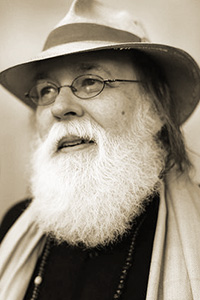Remembering Norman Dubie (1945–2023)
Gregory Donovan
 |
||
When death finally found the exuberant and profound writer Norman Dubie on February 20, 2023 at the age of seventy-seven, he had authored some thirty books of the most brilliant and provocative poetry and aphorisms of any literary figure of his era, a legacy of lasting inspiration to all of his readers and an instigation for them to follow his words into an expansion of their own imaginations in ways that might encompass and appreciate all the delights and surprises, wisdom and risks, that are available for discovery in his literary creations. Dubie’s work has exhibited a vast, wide-ranging subject matter arising from history, the arts, politics, culture, philosophy, mysticism, and religious traditions from East and West, with a particular engagement in capturing the spirit and experiences of remarkable individuals from many eras and in myriad identities as embodied in the persona poems for which he is so well known. From his earliest poems published in The Horsehair Sofa (Goddard Journal Publications, 1969) and Alehouse Sonnets (University of Pittsburgh Press, 1971), on through the publication of his Selected and New Poems (W.W. Norton & Company, 1983), followed by the central trilogy of collections he produced mid-career—The Springhouse (W.W. Norton & Company, 1986), Groom Falconer (W.W. Norton & Company, 1989), and Radio Sky (W.W. Norton & Company, 1991)—and later producing the massive accomplishment of The Mercy Seat: Collected & New Poems 1967–2001 (Copper Canyon Press, 2001), he then entered a final phase of work often rooted in his dreams, culminating in his Quotations of Bone (Copper Canyon Press, 2016), which won the prestigious Griffin International Poetry Prize, and what is likely to be his final collection, Robert Schumann Is Mad Again (Copper Canyon Press, 2019). All along he exhibited a tremendous power of imagination that fueled the vivid, striking imagery of his poems and created the impression that he was able to cross all boundaries of time and space to gather his materials directly from the source. He lived in a modest apartment in Tempe that he had turned into a kind of temple filled with Buddhist icons and sacred objects, a sanctuary where he meditated daily and wrote prodigiously.
Despite his being awarded numerous major awards for his writing, having his poetry translated into more than thirty languages, and producing a body of work that has been widely imitated and honored, Dubie eschewed the grasping ambitions of so many poets of his stature and did not travel the country giving poetry readings or attending panels, instead focusing on his students and his poems. His primary method of instruction was encouragement, and he was generous to students not only with his time but also on occasion by inventing university awards or travel grants that did not exist but which were funded out of his own pocket to give to those he’d discovered were in financial need. Dubie was a generous friend to the Blackbird journal as well, publishing frequently here, including more than two dozen poems over seventeen years (including the title poem of Quotations of Bone), and most notably placing a complete book-length poem with us, published serially in three installments over three issues, “The Spirit Tablets at Goa Lake”—a futurist sci-fi epic poem predicting that the means of intergalactic space travel would not necessarily require the four-hundred-foot tall rockets of an Elon Musk, but instead could be accomplished with astral projection—something about which Dubie, as a student and devotee of a particularly mystical branch of Buddhism, knew about and perhaps quietly practiced.
The editors of Blackbird remember Norman Dubie with admiration and gratitude and recommend his writing to you with great pleasure and a joy whose only note of sadness is the regret that he will not be offering us more of his astonishing poems. ![]()
Norman Dubie was the author of thirty books of poetry, most recently Robert Schumann Is Mad Again (Copper Canyon Press, 2019). His previous volume, The Quotations of Bone (Copper Canyon Press, 2015), won the 2016 Griffin International Poetry Prize. His poems have appeared in such magazines as The New Yorker, The American Poetry Review, Narrative, Blackbird, Lake Effect, Bombay Gin, The Paris Review, and Fiddlehead. He was the recipient of many fellowships including the John Simon Guggenheim Memorial Foundation, the Ingram Merrill Foundation, and the National Endowment for the Arts; he was also awarded the Bess Hokin Prize from the Poetry Foundation.
Gregory Donovan is a cofounder of Blackbird.